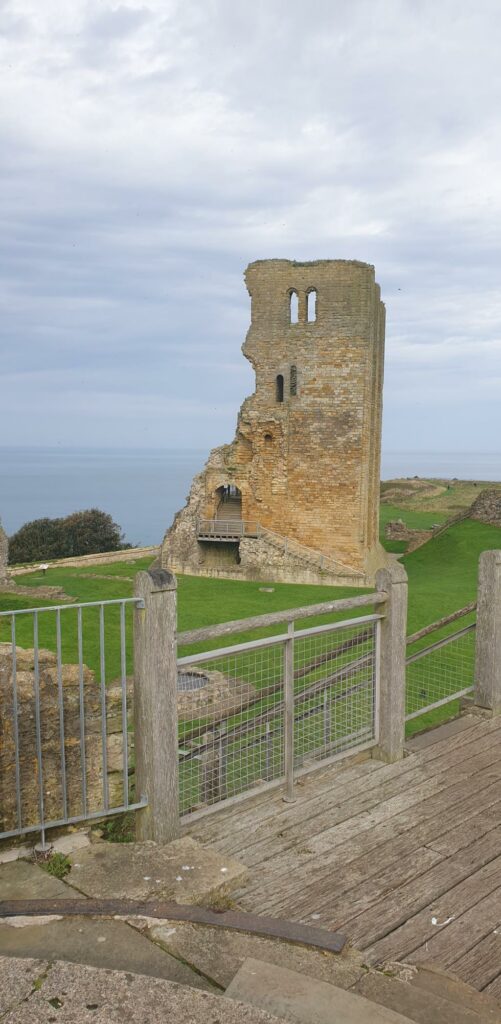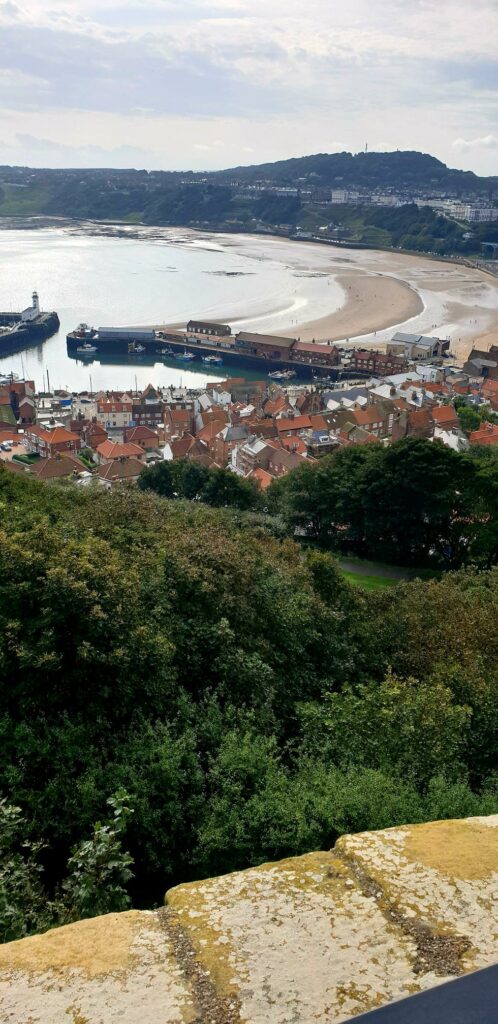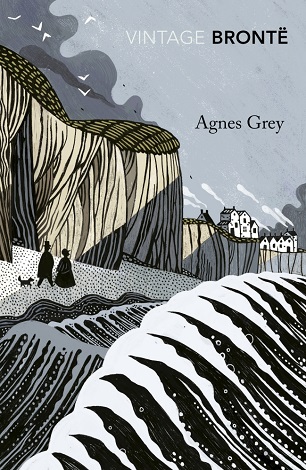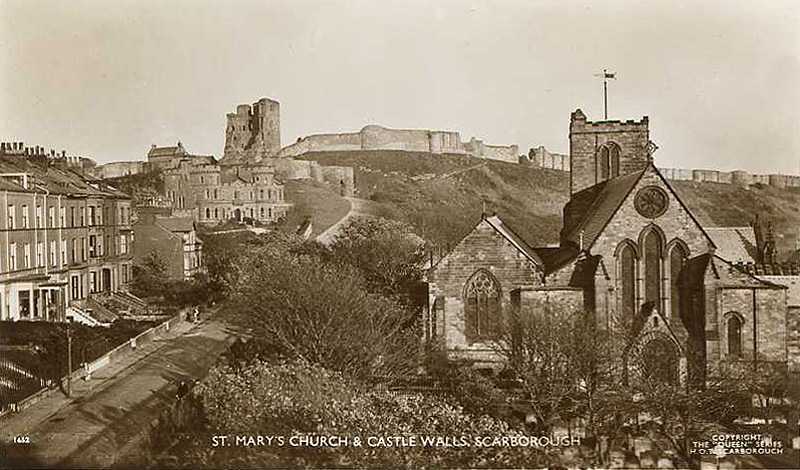This time last week I was in a resort very well known to Anne Brontë: it was a place she had come to for many years as a governess to the Robinson family of Thorp Green near York, and it was the place where she came to take healing waters after her diagnosis of tuberculosis, it was the place she came to die. Above all, however, it was the place she loved, and in today’s post we’re going to look at one particularly part of this jewel of the east coast: Scarborough Castle.
Anne lies eternally at the foot of Scarborough Castle, in the cemetery of St. Mary’s Church. Whilst visiting Anne I was delighted to see, as always, a steady stream of visitors coming to pay their respects to Anne Brontë, and there was a very touching tribute next to her headstone. There were also two ladies tending Anne’s grave, who I subsequently found out were the founders of the new Anne Brontë Society! They are currently holding an Anne Brontë exhibition at Scarborough’s Maritime Museum and Heritage Centre, so I will bring you more on the exhibition, the society and Anne’s grave in next week’s post!

Scarborough Castle dominates the resort, and its position high on a promontory means it can be seen from miles around. Wherever you are in Scarborough, look upwards and you will see the Castle and below it another landmark visible across the town – the large church of St. Mary’s where Anne has her eternal rest.
Scarborough was the largest castle by footprint in the whole of the United Kingdom, so it must have been an imposing site in its prime. It was badly damaged during a Civil War siege in 1645 however, and some of the huge cannonballs that devastated the walls can still be seen in its visitor centre.

It was further damaged by shelling from German warships in 1914, but the glorious ruins of the castle that we see today are still very much like those Anne Brontë would have been so familiar with. The ocean was Anne’s constant delight; we read in her poems such as ‘My Soul Is Awakened’ how Anne loved to see and hear the crashing waves of the sea:
‘My soul is awakened, my spirit is soaring,
And carried aloft on the wings of the breeze;
For, above, and around me, the wild wind is roaring
Arousing to rapture the earth and the seas.
The long withered grass in the sunshine is glancing,
The bare trees are tossing their branches on high;
The dead leaves beneath them are merrily dancing,
The white clouds are scudding across the blue sky.
I wish I could see how the ocean is lashing
The foam of its billows to whirlwinds of spray,
I wish I could see how its proud waves are dashing
And hear the wild roar of their thunder today!’

There are few better spots in Scarborough to see the waves dashing than from the long, extended ramparts around Scarborough Castle, for it affords views of both the North Bay, now filled with surfers and paddle boarders, and the South Bay with its long golden beaches perfect for holiday makers and (out of season) their dogs. With its sparse beauty, and its centuries of history, it is also a romantic spot, and Anne must have felt this deeply during her climbs up to the top of the castle’s hill. We can deduce this as it is the very spot that she chose for the proposal scene in her first (and often autobiographical) novel Agnes Grey:
‘One evening, however, in the last week of the vacation, he arrived—unexpectedly: for a heavy and protracted thunder-shower during the afternoon had almost destroyed my hopes of seeing him that day; but now the storm was over, and the sun was shining brightly.
“A beautiful evening, Mrs. Grey!” said he, as he entered. “Agnes, I want you to take a walk with me to -” (he named a certain part of the coast—a bold hill on the land side, and towards the sea a steep precipice, from the summit of which a glorious view is to be had). “The rain has laid the dust, and cooled and cleared the air, and the prospect will be magnificent. Will you come?”
“Can I go, mamma?”
“Yes; to be sure.”
I went to get ready, and was down again in a few minutes; though, of course, I took a little more pains with my attire than if I had merely been going out on some shopping expedition alone. The thunder-shower had certainly had a most beneficial effect upon the weather, and the evening was most delightful. Mr. Weston would have me to take his arm; he said little during our passage through the crowded streets, but walked very fast, and appeared grave and abstracted. I wondered what was the matter, and felt an indefinite dread that something unpleasant was on his mind; and vague surmises, concerning what it might be, troubled me not a little, and made me grave and silent enough. But these fantasies vanished upon reaching the quiet outskirts of the town; for as soon as we came within sight of the venerable old church, and the – hill, with the deep blue beyond it, I found my companion was cheerful enough.
“I’m afraid I’ve been walking too fast for you, Agnes,” said he: “in my impatience to be rid of the town, I forgot to consult your convenience; but now we’ll walk as slowly as you please. I see, by those light clouds in the west, there will be a brilliant sunset, and we shall be in time to witness its effect upon the sea, at the most moderate rate of progression.”
When we had got about half-way up the hill, we fell into silence again; which, as usual, he was the first to break.
“My house is desolate yet, Miss Grey,” he smilingly observed, “and I am acquainted now with all the ladies in my parish, and several in this town too; and many others I know by sight and by report; but not one of them will suit me for a companion; in fact, there is only one person in the world that will: and that is yourself; and I want to know your decision?”
“Are you in earnest, Mr. Weston?”
“In earnest! How could you think I should jest on such a subject?”
He laid his hand on mine, that rested on his arm: he must have felt it tremble – but it was no great matter now.
“I hope I have not been too precipitate,” he said, in a serious tone. “You must have known that it was not my way to flatter and talk soft nonsense, or even to speak the admiration that I felt; and that a single word or glance of mine meant more than the honied phrases and fervent protestations of most other men.”
I said something about not liking to leave my mother, and doing nothing without her consent.
“I settled everything with Mrs. Grey, while you were putting on your bonnet,” replied he. “She said I might have her consent, if I could obtain yours; and I asked her, in case I should be so happy, to come and live with us – for I was sure you would like it better. But she refused, saying she could now afford to employ an assistant, and would continue the school till she could purchase an annuity sufficient to maintain her in comfortable lodgings; and, meantime, she would spend her vacations alternately with us and your sister, and should be quite contented if you were happy. And so now I have overruled your objections on her account. Have you any other?”
“No – none.”
“You love me then?” said he, fervently pressing my hand.
“Yes.”’

This beautifully simple and modest passage is Anne imagining how things might have been. She (who is clearly Agnes) never got to take that walk with her love Reverend Weightman (clearly the model for Reverend Weston). Weightman’s tragic early death robbed her of that joy, so she imagined it in print, and by doing so almost, so nearly, brought her dreams to life. If you get the chance to take your love to Scarborough Castle do so, and visit Anne’s grave en route or on your return.
Apologies that today’s post has arrived a day later than usual, yesterday was taken up helping my father who has just returned from a hip replacement operation. I hope you can join me later this week, on Sunday, for a new Brontë blog post.
